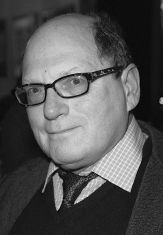Professional Description Essay
Oscar Hijuelos
Memories of New York City Snow

Oscar Hijuelos, the son of Cuban immigrants, was born in New York City in 1951. After receiving undergraduate and master’s degrees from the City University of New York, he took a job at an advertising firm and wrote fiction at night. His first novel, The Mambo Kings Play Songs of Love (1989), was awarded the Pulitzer Prize for fiction, making Hijuelos the first Hispanic writer to receive this honor. His most recent novels include Dark Dude (2008) and Beautiful Maria of My Soul (2010).
The following essay was taken from the anthology Metropolis Found (2003). In it, Hijuelos describes a New York City winter from the perspective of new immigrants.
Vocabulary development
circa: [taken] around
aloft: high
trestles: support structures
tenement houses: apartment buildings, often crowded and in poor shape
girded: reinforced
burlesque houses: theaters that offer live, often humorous performances and/or striptease acts
palatial: palace-
perilous: dangerous
nary: not even
stint: brief job
toque: hat
to the hilt: [dressed] in the fanciest clothing
nostalgia: a longing for something from the past
connotation: meaning or association
inaccessible divinity: unreachable god
1
For immigrants of my parents’ generation, who had first come to New York City from the much warmer climate of Cuba in the mid-
2
That they bothered to have this photograph taken — I suppose to send back to family in Cuba — has always been a source of enchantment for me. That something so common to winters in New York would strike them as an object of exotic admiration has always spoken volumes about the newness — and innocence — of their immigrants’ experience. How thrilling it all must have seemed to them, for their New York was so very different from the small town surrounded by farms in eastern Cuba that they hailed from. Their New York was a fanciful and bustling city of endless sidewalks and unimaginably high buildings; of great bridges and twisting outdoor elevated train trestles; of walkup tenement houses with mysteriously dark basements, and subways that burrowed through an underworld of girded tunnels; of dancehalls, burlesque houses, and palatial department stores with their complement of Christmas Salvation Army Santa Clauses on every street corner. Delightful and perilous, their New York was a city of incredibly loud noises, of police and air raid sirens and factory whistles and subway rumble; a city where people sometimes shushed you for speaking Spanish in a public place, or could be unforgiving if you did not speak English well or seemed to be of a different ethnic background. (My father was once nearly hit by a garbage can that had been thrown off the rooftop of a building as he was walking along La Salle Street in upper Manhattan.)
3
Even so, New York represented the future. The city meant jobs and money. Newly arrived, an aunt of mine went to work for Pan Am; another aunt, as a Macy’s saleslady. My own mother, speaking nary a word of English, did a stint in the garment district as a seamstress. During the war some family friends, like my godfather, were eventually drafted, while others ended up as factory laborers. Landing a job at the Biltmore Men’s Bar, my father joined the hotel and restaurant workers’ union, paid his first weekly dues, and came home one day with a brand new white chef’s toque in hand. Just about everybody found work, often for low pay and ridiculously long hours. And while the men of that generation worked a lot of overtime, or a second job, they always had their day or two off. Dressed to the hilt, they’d leave their uptown neighborhoods and make an excursion to another part of the city — perhaps to one of the grand movie palaces of Times Square or to beautiful Central Park, as my father and godfather, and their ladies, had once done, in the aftermath of a snowfall.
4
Snow, such as it can only fall in New York City, was not just about the cold and wintry differences that mark the weather of the north. It was about a purity that would descend upon the grayness of its streets like a heaven of silence, the city’s complexity and bustle abruptly subdued. But as beautiful as it could be, it was also something that provoked nostalgia; I am certain that my father would miss Cuba on some bitterly cold days. I remember that whenever we were out on a walk and it began to snow, my father would stop and look up at the sky, with wonderment — what he was seeing I don’t know. Perhaps that’s why to this day my own associations with a New York City snowfall have a mystical connotation, as if the presence of snow really meant that some kind of inaccessible divinity had settled his breath upon us.
Question
Write the thesis statement.
Write the thesis statement.Question
List the sensory details (sight, sound, smell, taste, texture).
List the sensory details (sight, sound, smell, taste, texture).Question
List the transitions.
List the transitions.Question
Does the essay create a clear picture of New York City in the winter? Why or why not?